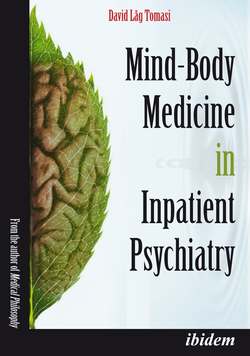Читать книгу Mind-Body Medicine in Inpatient Psychiatry - David Låg Tomasi - Страница 17
На сайте Литреса книга снята с продажи.
Group Therapy/Psychotherapy Assessment
ОглавлениеMore specific to this professional figure, this area of the psychotherapist’s assessment focuses on the following aspects:
Strengths & Skills/Presentation: The psychotherapist evaluates specific observed vs. self-reported characteristics, including Current Functioning, Orientation, Appearance/Personal Hygiene, and Eye Contact.
Patient’s Goals for Admission: This section examines the patient’s perspective on the current admission, and is inclusive of the primary area of concern (self-reported vs. observed or based on HPI/collateral information/previous admissions)
Special Needs or Challenges: Beyond referring to the psychiatric HPI, this section focuses on mental/medical problems and/or comorbidities, as well as patient’s preferences (from general medical history and review of records/psychological testing, Present Illness, Psychiatric Review of Systems, Psychiatric Treatment History, Substance Abuse History, Family History, Developmental and Social History, Sexual History, Medical/Surgical History, Mental Status Examination, to allergies, intolerances or patient-specific special needs, such as sensitivity to specific audio-visual stimuli or environmental elements)
Assessment: The full psychotherapeutic assessment of the patient, on the base of direct evaluation and collateral/HPI-based information, inclusive of suicidal/homicidal ideation/intent, somatic presentation, insight, intelligence, memory/cognition, and mood/affect.
Plan: The psychotherapist evaluates specific individual or group psychotherapy sessions and other therapeutic activities, to provide an individualized, patient-centered therapeutic modality for the current admission. The plan is updated every week (generally on Wednesday evening/Thursday after morning rounds) to evaluate current psychological data, as well as to work towards future discharge plans and outpatient therapy, in collaboration with the Multidisciplinary Treatment Team.
The Group Therapist/Psychotherapist thus directly interacts with the Multidisciplinary Treatment Team to provide an integrated/integrative form of therapy, with a special focus on individualized medicine and patient-centered clinical approach. While the psychotherapist’s job also involves support and supervision of other professionals in the team3, this professional represents a more mind-body perspective on the clinical treatment of the patient, whether as part of group sessions or individual psychotherapy. In any case, to account for the intrinsic complexity of diagnostic presentations on both Shepardson 3 and 6, each member of the Multidisciplinary Treatment Team in Inpatient Psychiatry plays a fundamental role in the delivery of the best possible care, as in the following scheme:
| Degree Level4 | Title5 | Type of Degree | Multidisciplinary Treatment Team Member (yes/no)6 |
| 3 | Doctors7 | PhD | yes |
↑
| 2 | Pharmacists, Physicians/Psychiatrists, Psychologists/Psychotherapists, Social Workers8 | MA/MD/MS9 | yes |
↑
| 1 | Registered Nurses & Bachelor’s Level Clinicians10 | BA/BS/BSN | yes |
↑
| N/A | Assistants, technicians11 | AA/AAS/ADN | no |
↑
| N/A | Administrative staff/Management/Students/Volunteers/Interns12 | AA/AAS/ADN or BA/BS/BSN | no13 |
↑
| N/A | Support staff/Facilities14 | AA/AAS/ADN or HS diploma/GED | no |
Finally, from the perspective of Psychotherapy in Inpatient Psychiatry, and more specifically psychotherapeutic interventions at the UVM Medical Center, it is fundamental to stress that on the Shepardson 3 (south) unit, most diagnosis and related clinical interventions focus on mood and personality disorders, in particular Bipolar Affective Disorder, Borderline personality Disorders as well as Major depressive Disorders. On the Shepardson 6 unit instead, the focus is on schizophrenia, schizoaffective disorders, as well as manic, psychotic, delusional presentations in general. Of course, there is a diagnostic overlap between the two units, resulting in patients being transferred from 3 to 6 and vice versa, based on specific clinical needs, although the acuity of presentations and relatively higher degree of involuntary admission is generally higher on Shepardson 6.
